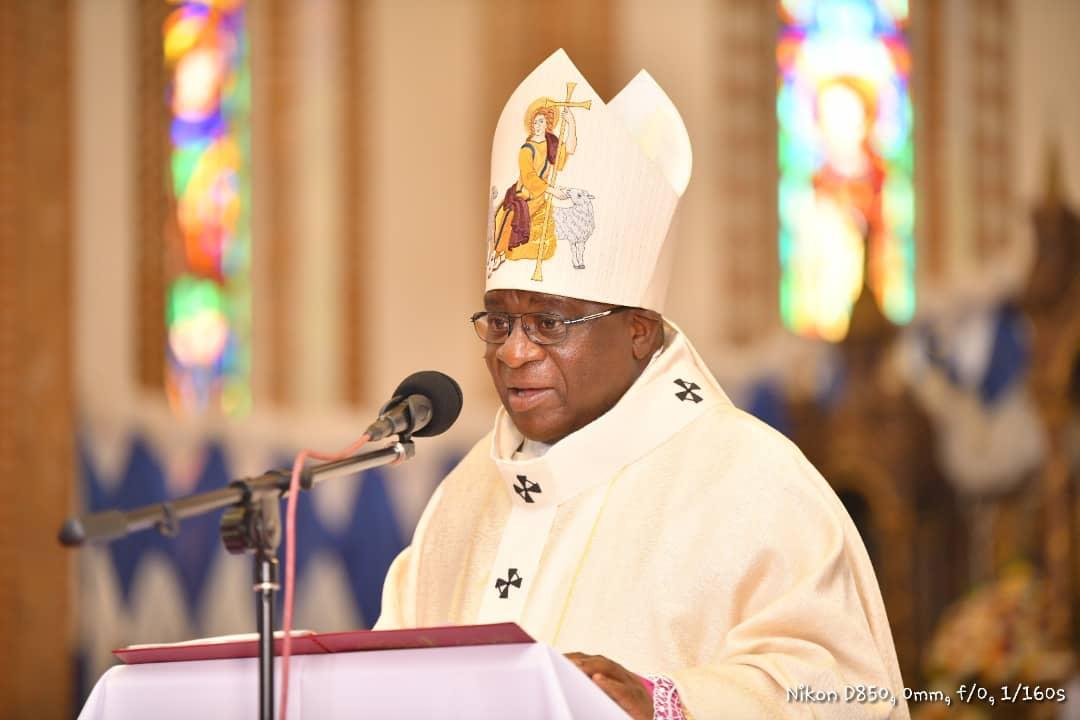
His Grace Dr. Paul Ssemogerere, the Archbishop of Kampala, has reassured the Catholic faithful that the principles and traditions surrounding marriage in the Catholic Church remain steadfast and unaltered.
Emphasizing that, according to Catholic doctrine, marriage constitutes the union between one man and a female, Archbishop Ssemogerere underscored that the Church unequivocally prohibits and has not sanctioned the blessing of any alternative unions.
This was part of his statement while engaging with the media after delivering his Christmas and New Year’s message at Lubaga Cathedral today’s morning. To underscore the importance of his statement and provide clarity, the Archbishop, who initially spoke in English, took the initiative to translate his remarks into Luganda, which is widely spoken within the Kampala Archdiocese.
The recent release of a document from the Dicastery of the Doctrine of the Faith regarding the pastoral significance of blessings has sparked controversy among Catholics in Uganda and potentially on a global scale. Numerous individuals have provided their interpretations of the document, contributing to the ongoing discussions and debates within the Catholic community.
The document permits clergy to bestow blessings upon individuals in irregular situations who earnestly seek a connection with God. In the document, the act is seen as a means to potentially foster an increased trust in God among those involved in sinful circumstances.
“This is a blessing that, although not included in any liturgical rite, unites intercessory prayer with the invocation of God’s help by those who humbly turn to him. God never turns away anyone who approaches him! Ultimately, a blessing offers people a means to increase their trust in God,” the document reads in part.
It further adds; “The request for a blessing, thus, expresses and nurtures openness to the transcendence, mercy, and closeness to God in a thousand concrete circumstances of life, which is no small thing in the world in which we live. It is a seed of the Holy Spirit that must be nurtured, not hindered.”
Archbishop Ssemogerere, expressing a reluctance to delve into extensive commentary on the matter, emphasized that speculation should be avoided. He explicitly stated that no one should assert that the teachings of the church have been altered by His Holiness.
Furthermore, he added that the Pope is a compassionate individual embodying the mercy of Christ. The Archbishop highlighted that the Pope consistently encourages fellow Catholics to engage in prayer for one another, particularly in addressing questions related to being sinful and recognizing one’s status as a sinner.
He also emphasized that while the church maintains its stance on the union being solely between one man and one woman, it does not intend to cast aside those entangled in this sinful inclination. The Archbishop highlighted the importance of finding ways to evangelize and preach to them, guiding them to recognize and understand that what they are practicing is considered sinful.
The message closely echoed the sentiments expressed by Víctor Manuel Cardinal Fernández, the Prefect of the Dicastery of the Doctrine of the Faith. In the preface of the document, Cardinal Fernández provided a concise presentation clarifying, among other things, what the declaration is not.
“…this declaration remains firm on the traditional doctrine of the Church about marriage, not allowing any type of liturgical rite or blessing similar to a liturgical rite that can create confusion,” Cardinal Prefect, Víctor Manuel Fernández wrote.
Cardinal Fernández further emphasized that within this context, one can grasp the rationale behind the potential blessing of couples in irregular situations, encompassing those cohabiting, involved in polygamous unions, or same-sex couples. Importantly, he clarified that such blessings do not constitute an official validation of their status nor do they alter the Church’s enduring teachings on marriage in any manner.
Meanwhile, regarding Christmas, the Archbishop extended heartfelt Christmas wishes to the faithful, urging them to celebrate in meaningful ways. He highlighted eight themes for Christians to reflect upon as they commemorate the birth of Christ. These include championing justice and equity, protecting the environment, nurturing spiritual growth, maintaining hope even in times of uncertainty, embracing the gift of love, cultivating peace and reconciliation, and approaching the future with optimism.
Ssemogerere also appealed to the faithful to extend a compassionate hand to those who are lonely and forgotten, emphasizing that a simple gesture towards them can brighten their holiday season.

















